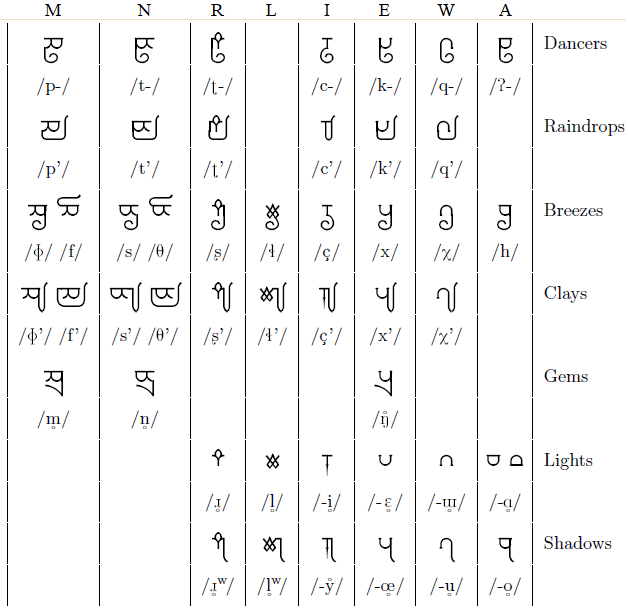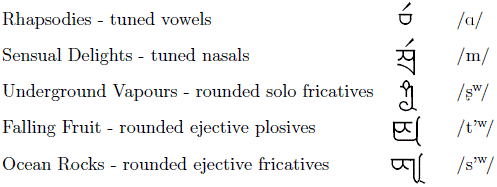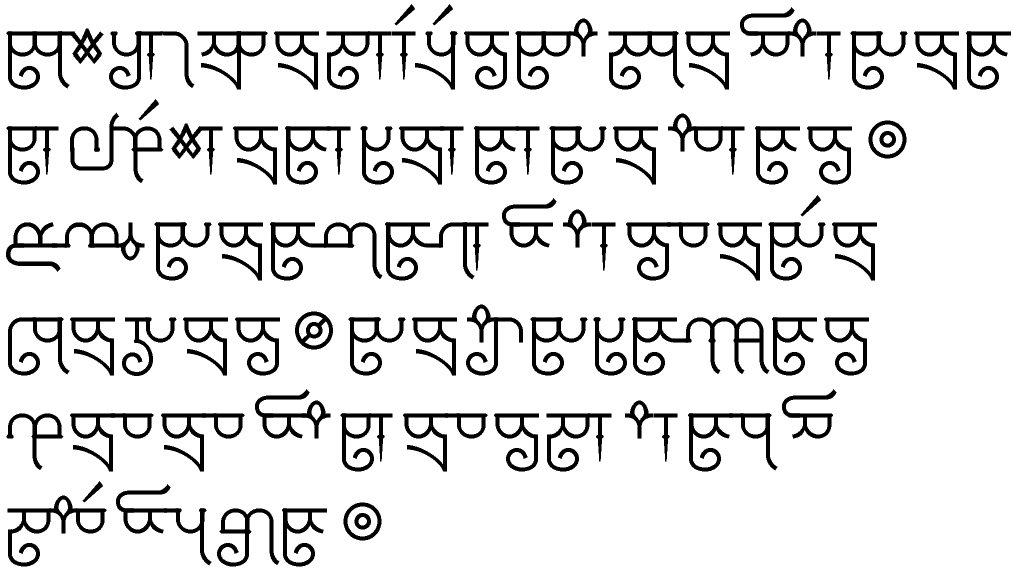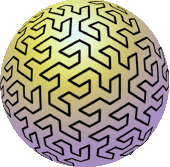This imaginary script was inspired by various ancient South Asian systems, and is an offshoot of SIGIL and my Language for the World project. The name Xylphika is a pseudo-Greek back-derivation from Paracelsus’ coinage, meaning “out of the Sylphic”, suggesting translation from the words of an imaginary, intelligent, elfin-like people.
Internal history
Xylphika is the rarely-seen written form of a language sometimes heard by humans, who usually don’t realize it is a language at all, or who do, but can’t believe their ears. It is used by an ancient race of human-like beings who, through the use of various tricks, remain almost completely invisible to modern humans. They are often confused with elves or undines.
Features of the language
- voicing is rarely applied, so most speech resembles whispering.
- phonemes are grouped systematically, and are named after elements of their mythology.
- the sounds are extremely soft, sweet and fascinating to human listeners.
- phrases are often delivered in swift outbursts; these are usually rich in meaning.
- phrases can also be delivered in long continuous streams by using both egressive and ingressive phonemes; these are usually light-hearted or seductive in nature.
- voiced plosives ([b],[d] etc) are considered vulgar, and only emerge in very rare displays of anger or frustration.
- the language has changed very little over the last 5,000 years and all dialects across the planet are still mutually intelligible to a great extent.
- many species of animal and bird can understand it well, but few can speak it.
- when written on water, information in the text can be stored in the body of water, to be later retrieved directly by the tongue (details of this technique not known).
Features of the script
- phonetically consistent.
- vowels are considered extensions to consonants and their phonemic region (or vice versa), and the script functions more like a syllabary than an alphabet – vowels are written attached to consonants.
- voiced phonemes carry diacritics above, which give melodic information; the simplest/vaguest mark is an acute.
- other modifications to the base forms are written as tails below the baseline.
- ingressive phrases are written upside-down (reflected vertically).
- the basic letters are easy to write, but complex decorative filigree and knotting is usually added, the style of which depends on region and tribe.
- most phrases are composed so they can be read in reverse with little loss of meaning; this is due to peculiarities of the grammar and the strong use of metaphor; these then form semantic palindromes.
- most artifacts of writing are intentionally disguised as natural formations, or are written at such great speed that the letter forms become very free and irregular, or are written with impermanent materials.
- there are many more writing systems for Xylphika than there are dialects; the one reproduced here is from a South Pacific region.
The phoneme groups
The base shapes are here given a Latin letter mnemonic. They roughly represent phonetic regions: labial, dental, rhotic/retroflex, lateral, palatal, velar, uvular, glottal. One-sided forms of the E and W bases are also available for use in drawing certain consonant-vowel combinations.
Below is an expanded chart of the principal glyphs (unvoiced/whispered phonemes), with the traditional names of the phoneme effects in the rightmost column.
Other phonemes
Some other modifiers are available. The acute diacritic shows full voicing. Other tails show extra rounding effects. Again, each has a traditional name. An example of each is given here.
Egressive forms of all the above phonemes are called Governing. Many of them can be ingressive (made with an inward breath); they are then called Astral.
Rare phonemes
Dead Trees – voiced fricatives
Human Weapons – voiced plosives
Other symbols
Example
The following passage is an imitation of human speech (English), mostly whispered. Note the brief section of ingressive speech in the middle, allowing a perfectly continuous flow of quiet sound.
Approximate transliteration (Article 1 of the Universal Declaration of Human Rights):
All human beings are born free and equal in dignity and rights. They are endowed with reason and conscience and should act towards one another in a spirit of brotherhood.
In Xylphika, this passage reads as a joke about two human brothers married to the same wife.
A version of this page can also be found on
Omniglot.
A short version of this page in Chinese is
here.







